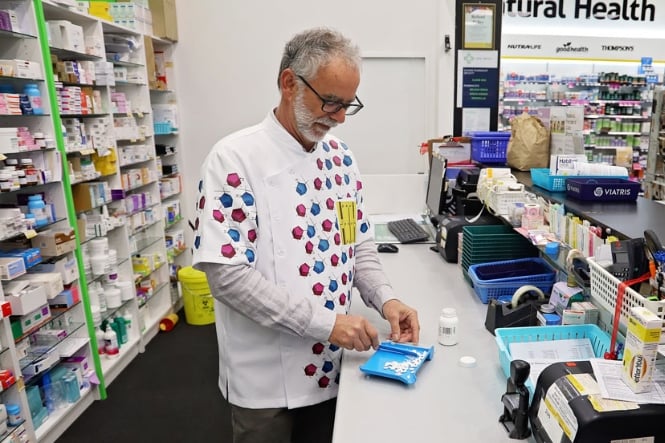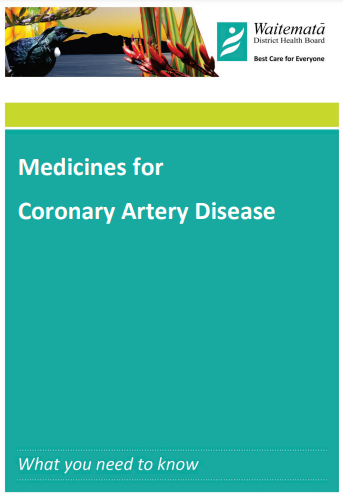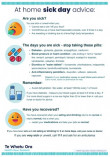Medicines used for heart problems
Key points about cardiovascular medicines
- If you have heart disease, high blood pressure or heart failure, you are likely to be taking medicine to manage these.
- There are many types and combinations of medicines used.
- This page provides a summary of the most common medicines.

Heart problems are caused by cardiovascular disease – a term used for all types of diseases that affect your heart or blood vessels. This includes strokes, peripheral artery disease and coronary artery disease (clogged arteries) which can cause heart attacks and congenital heart disease.
As well as self-care and lifestyle changes, medicines are prescribed to manage heart problems.
- These medicines work best if they're taken regularly.
- If you get side effects, talk to your doctor before stopping your medicines. It can take a while to find the right dose and combination for you.
- Many of the medicines you need to take to strengthen your heart start with a small dose and are built up gradually, depending on whether you have any side effects.
Many people with cardiovascular disease may also be started on cholesterol lowering medicines such as atorvastatin, simvastatin, ezetimibe or bezafibrate. Cholesterol-lowering medicines have been shown to reduce the risk of heart attack or stroke for people with high cholesterol. Read more about cholesterol lowering medicines.
Anticoagulants are often referred to as ‘blood thinners’ but they actually work by interrupting the clot-forming process and increasing the time it takes for clots to form. This helps prevent blood clots from forming and stops existing clots from getting bigger.
| Examples | Uses |
|
These are prescribed for people who are at risk of blood clots or stroke, where blood clots form in your heart and travel to your brain (usually due to an irregular heart rhythm known as atrial fibrillation). Read more about anticoagulants. |
Use with antiplatelets
Your healthcare provider may prescribe anticoagulants in combination with antiplatelet medicines such as asprin or clopidogrel.
- These medicines taken together, can be very effective. But there’s a higher risk of bleeding, usually in your stomach or gut.
- This risk increases with age.
-
This combination of treatment is usually prescribed for a certain amount of time. After this, your specialist will usually tell you to stop 1 of the 2 antiplatelet medications. It’s important to check with your healthcare provider when you should stop taking them both together.
The following animation describes how anticoagulants such as dabigatran, rivaroxaban and apixaban work in your body.
Video: How do novel oral anti-coagulants (NOACs) work?
(British Heart Foundation, UK, 2018)
These medicines stop blood clots from forming by preventing blood platelets from sticking together.
| Examples | Uses |
|
These are prescribed for people who have had a heart attack, chest pain (angina), strokes, TIA (transient ischemic attacks, or ‘little strokes’) and other forms of cardiovascular (heart) disease. They are also used if you have plaque build up in your blood vessels but don't as yet have a large obstruction in the artery. |
Two antiplatelet medications or use with anticoagulants
Your healthcare provider may prescribe two antiplatelets together. Using the 2 medicines together is called dual (two) anti-platelet therapy (DAPT).
Antiplatelet medicines may also be used in combination with anticoagulant medicines such as dabigatran, rivaroxaban or warfarin.
- These medicines taken together, can be very effective. But, there’s a higher risk of bleeding, usually in your stomach or gut.
- This risk increases with age.
- This combination of treatment is usually prescribed for a certain amount of time. After this, your specialist will usually tell you to stop 1 of the 2 antiplatelet medications. It’s important to check with your healthcare provider when you should stop taking them both together.
ACE inhibitors relax your blood vessels allowing your blood to flow more easily. This lowers your blood pressure and reduces the amount of work your heart needs to do to pump blood around your body.
| Examples | Uses |
|
|
The following animation describes how ACE inhibitors work in your body.
Video: How do ACE inhibitors work?
(British Heart Foundation, UK, 2018)
ARBs expand your blood vessels and allow blood to flow more easily. This reduces your heart's workload and makes your heart work more efficiently. ARBs are also called ‘sartans’.
| Examples | Uses |
|
|
Beta blockers decrease your heart rate. This lowers your blood pressure and makes your heart beat more slowly and with less force.
| Examples | Uses |
|
|
The following animation describes how beta blockers work in your body:
Video: How do beta blockers work?
(British Heart Foundation, UK, 2018)
Calcium channel blockers decrease your heart rate. This lowers your blood pressure and makes your heart beat more slowly and with less force.
| Examples | Uses |
|
|
Diuretics make your body remove extra water and salts through peeing (passing urine). They are commonly called ‘water pills’. Diuretics are used to treat conditions such as high blood pressure (hypertension) and swelling (oedema) in your feet, ankles and stomach caused by heart failure, kidney failure or liver failure.
By decreasing the build up of fluid in your lungs and other parts of your body, diuretics improve breathing, reduce swelling and help to relieve the load on your heart. There are a few different types of diuretics. Examples are furosemide, bemetanide, bendroflumethiaide, chlortalidone and hydrochlorothiazide. Different diuretics remove fluid at different rates and through different methods.
Read more about diuretics.
Digoxin is used to treat abnormal heart rhythms (arrhythmias), including atrial fibrillation, by slowing your heart rate. This helps to reduce the strain on your heart. Digoxin also increases the force of your heart's contractions, which can be helpful if you have heart failure. Read more about digoxin.
Nitrates work by widening blood vessels, letting more blood and oxygen reach the heart which reduces strain on your heart, making it easier for your heart to pump blood.
Examples are glyceryl trinitrate spray and isosorbide mononitrate.
Entresto is a combination of 2 medicines – it works by relaxing your blood vessels and lowering the amount of water in your body. This reduces the amount of work your heart needs to do pump blood around your body.
Read more about Entresto.
There are studies that show sodium glucose co-transporter 2 inhibitor (SGLT-2) medicines are very useful for a type of chronic heart failure. They work by letting your heart use energy more efficiently and also act as a mild diuretic to help remove extra water from your body.
In Aotearoa New Zealand, SGLT2 inhibitors are currently only funded for people with diabetes but this may change in the near future. Examples are empagliflozin and dapagliflozin.
Spironolactone is an aldosterone antagonist that blocks a hormone called aldosterone which causes water and sodium to build up in your body. It also acts as a weak diuretic to lower the amount of water held in your body. This reduces the amount of work your heart needs to do to pump blood around your body.
Read more about spironolactone.
Brochures
5 questions to ask about your medications(external link) Health Quality and Safety Commission, NZ, 2019 English(external link), te reo Māori(external link)
Medicines for coronary artery disease(external link) Waitematā DHB, NZ English(external link), Chinese(external link), Korean(external link), Samoan(external link)
At home sick day advice(external link) Health New Zealand | Te Whatu Ora
Staying well with heart failure(external link) Heart Foundation, NZ
References
- Cardiovascular disease risk assessment and management(external link) New Zealand Formulary
- ESC and AHA guidelines – what is new and what is different?(external link) Research review, NZ, 2024
- Optimising management of heart failure in the community(external link) Research review, NZ, 2024
- What’s new in cardiovascular disease risk assessment and management for primary care clinicians(external link) BPAC, NZ, 2018
- Addressing heart failure in primary care: Part 1 – identifying and diagnosing heart failure(external link) BPAC, NZ, 2022
- Addressing heart failure in primary care: Part 2 – initiating and escalating treatment for heart failure(external link) BPAC, NZ, 2022
- Beta blockers for cardiovascular conditions – one size does not fit all(external link) BPAC, NZ, 2024
Brochures

Health Quality and Safety Commission, NZ, 2019 English, te reo Māori

Waitematā DHB, NZ

At home sick day advice
Health New Zealand | Te Whatu Ora, 2023
Credits: Sandra Ponen, Pharmacist, Healthify He Puna Waiora. Healthify is brought to you by Health Navigator Charitable Trust.
Reviewed by: Stephanie Yee, Pharmacist, Auckland
Last reviewed:
Page last updated:





